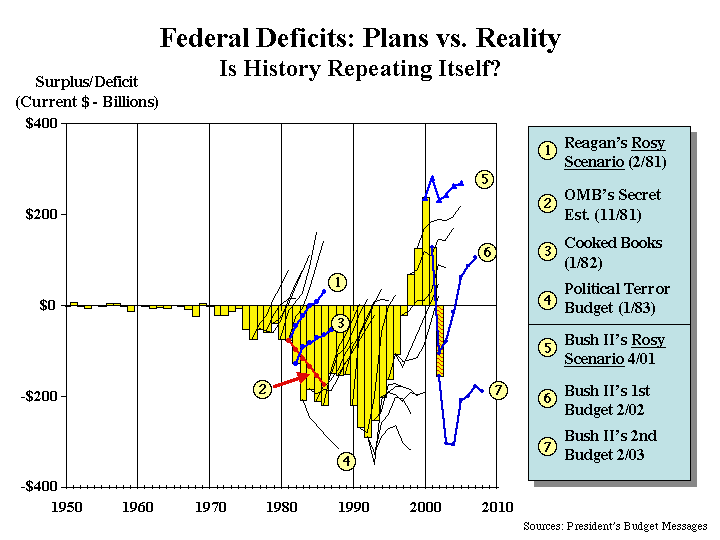|
The Madness of Versailles: Federal Budget Deficit Explodes February 3, 2003
URLs for Past Comments are Archived at the Defense & National Interest Website: Index_of_Comments Free Adobe Acrobat Reader can be downloaded from - http://www.adobe.com/products/acrobat/readstep.html The President just released the most unbalanced budget plan (for Fiscal Years 2004 thru 2008 - i.e., line "7") since Ronald Reagan terrorized Versailles on the Potomac in 1983 (i.e., line "4" in attached chart). My aim in this Blaster is to simply place Mr. Bush's new budget proposal in the context of past proposals. The attached chart does this by comparing planned deficits (the lines) to actual deficits (the bars) for budget proposals since the Ford Administration. For those of you with email systems that cannot read imbedded graphics, I am also attaching the chart as a separate Adobe PDF file. Old timers may recall how defenders of the terror budget of 1983 said it was really part of a premeditated plan to force cuts in social programs, put into place after tricking the political system into accepting Mr. Reagan's tax cuts and defense spending hikes, which Congress had joyously approved in 1981 and 1982. The buy-in took the form of hiding the future budgetary consequences of the tax cut and defense spending increases in the soothing scent of a rosy budgetary scenario in 1981 (see line "1") and then by deliberately cooking the books one year later, in January 1982 (see line"3"), even though OMB fully recognized the deteriorating situation in a secret estimate put together two months earlier in November 1981 (see line "2"), according to Mr. Reagan's OMB director David Stockman. Now look at Line #5. That is the rosy projection of future budget surpluses used by President Bush in April 2001 to sell his proposal for another round of tax cuts to the American people and Congress. Note how the near term surplus evaporated 10 months later, when Mr. Bush submitted his FY 2003-2007 budget plan in February 2002, but note also how he still predicted a rapid return to surpluses (i.e., line "6"). Whether deliberately or not, these soothing reductions in future deficits bought an another year to lock in the tax cuts and the defense spending increases, while conditioning the political environment to a new status quo. But as line "7" shows, those rosy expectations are now a distant memory, and the budget deficit shows every sign of coming unglued ... and now United States stands on the cusp of another war and there is talk of new tax cuts. I will have more to say on the Madness of Versailles in the future ... for now, I urge you to digest the numbers.
Chuck Spinney |
